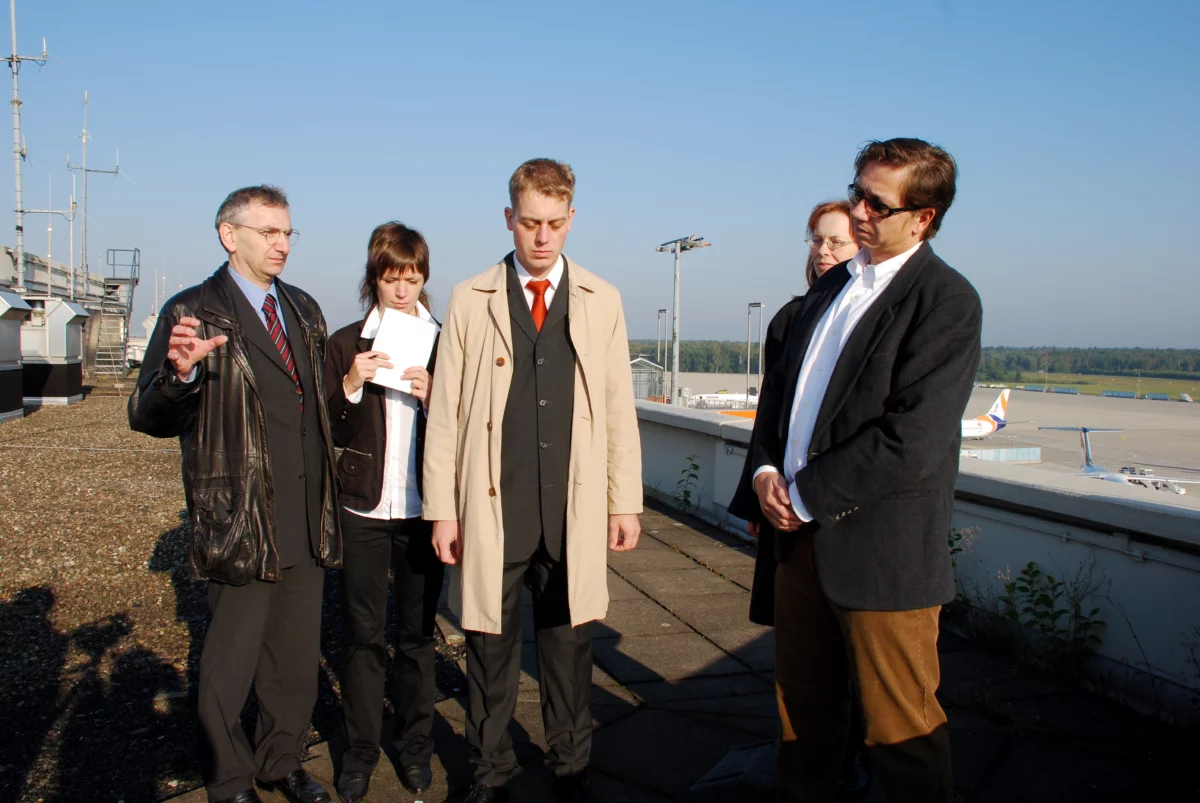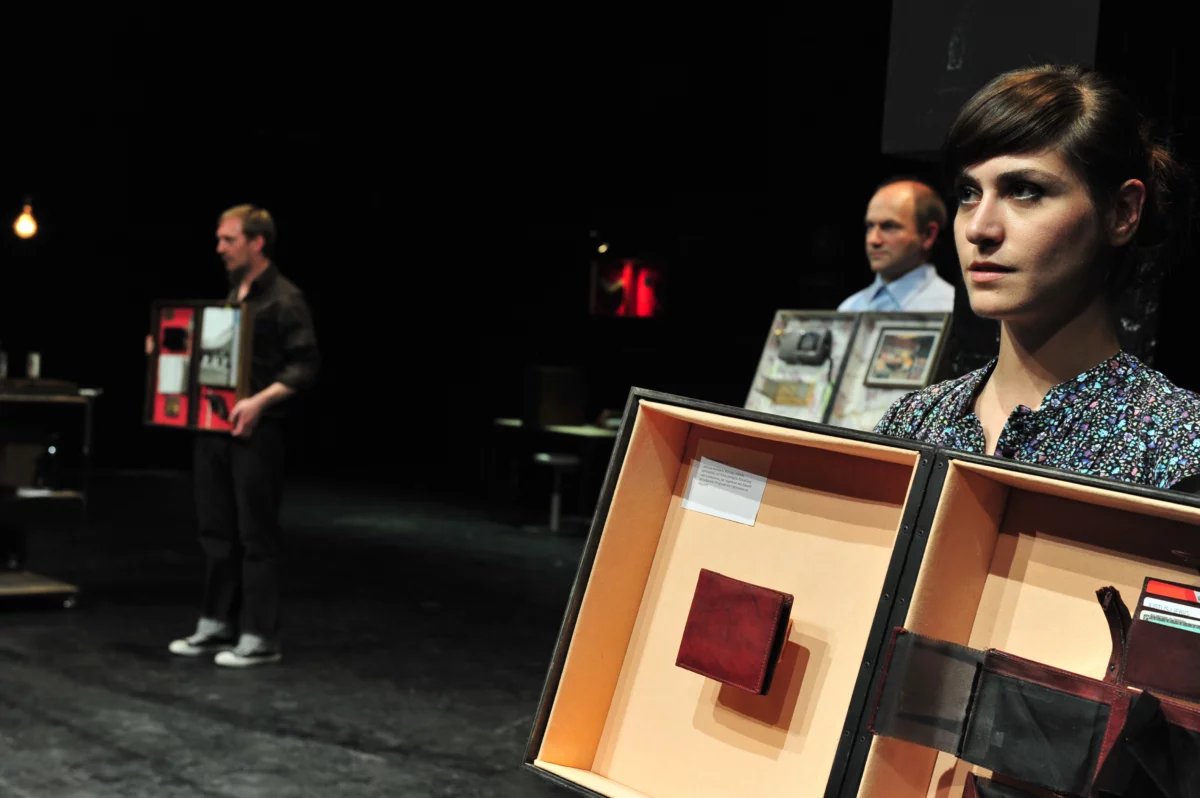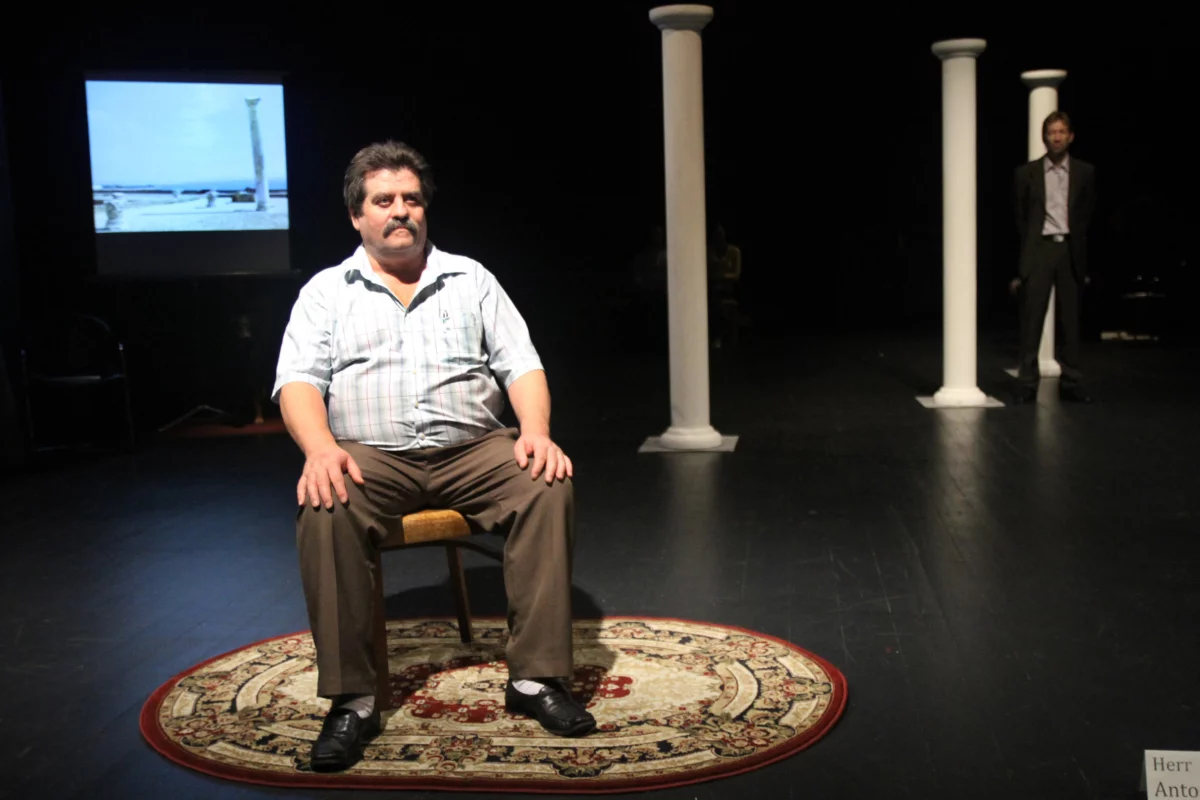"We don't want to become experts"
By Christine Wahl
The artistic duo Hannah Hofmann and Sven Lindholm have been developing formats at the interface between performative, visual and acoustic art for over 20 years. Cultural journalist Christine Wahl in an interview with the winners of the Tabori Prize 2023.
Ms. Hofmann, Mr. Lindholm, in your productions you either make an Opel factory disappear or the audience, bring dead mailboxes back to life or organize evenings where people hide – consensually – in other people's apartments. How do you actually come up with your original ideas?
Hannah Hofmann: That's not always clear to us either. In the beginning, there is usually the question of what social situation we are currently in, from which we deduce what topic we consider relevant. And then, by grappling with this theme, we try to develop a kind of scenic instruction manual.
Sven Lindholm: The crucial thing is that the starting point of our considerations is not an idea of what we want to say with our work, but rather that we develop formal approaches that actually produce something like content only in the second step, and as many different ones as possible. Actually, every person who enters our settings brings their own content with them.
Let's look at it in concrete terms: What thoughts, for example, were at the beginning of your most recent production Notes from Germany – and what "scenic instructions for use" did you then find for it?
Lindholm: Notes from Germany is a work that we were able to realize at the beginning of this year with the support of the Goethe-Institut in Argentina. In view of the very high inflation there, we felt we actually had to talk about money. On the one hand, it’s a topic that people there discuss every day, but on the other hand, we were also told that they don't necessarily like to do that, especially in public. So, we thought about what a scenario could look like that would make it possible to put money in the spotlight. And so, we came up with the idea of turning the tables and asking our audience to spend our fee.
Hofmann: We were interested in staging money instead of people, or rather the diverse relationships it creates: Visitors to the FIBA Festival in Buenos Aires could register individually to take part in the project. They each received 12,000 pesos – which at the time corresponded to about 300 euros – as well as a project agreement to sign, whereby they agreed to each spend a portion of our fee within 60 minutes at their own discretion and to record this process photographically. The project lasted until our fee was completely used up.
 © Hofmann Lindholm
© Hofmann Lindholm
Your artistic method has always been to intervene in everyday reality by means of scenic arrangements – as in Notes from Germany – and to make certain phenomena visible through corresponding shifts in perspective. In your earlier works, however, you were more often to be found on theater stages. In the meantime, it seems, you have moved more and more consistently away from the stage context and into the public space. What is the reason for this shift?
Hofmann: In the first 10 or 12 years, we mostly implemented actions with our accomplices that took place outside the theater – in public or private space – and were then followed by productions that reported on these actions and put them up for discussion.
You call the actors you work with "accomplices": people you recruit for your work from everyday contexts who, with a few exceptions, do not have any training as professional actors and who like to move with you in gray areas.
Hofmann: In 2011, we then reached a turning point with Heile Welt and presented an evening that took a critical look at the staging of "real" people and reflected on this process: We performed a marketing maneuver and invited people to use the stage as an advertising platform for their own ventures. The scenario – that was the critical aspect of it – explicitly exhibited the people, they themselves had nothing to say, instead they were talked about, or rather: things were projected onto them.
Lindholm: That coincided with an era during which authenticity was also being sold as a key tool in advertising, and this analogy reflected a lot back to us about our own way of working.
Hofmann: In addition, at some point in our accomplice pieces in the theater, we got the feeling: Now we're starting to know how this works. But we didn't see ourselves as experts, and we still don't want to become experts, but rather to keep opening up new areas in order to try out unfamiliar things. And since at the time we were getting top-level funding from the state of North Rhine-Westphalia for the first time, we finally had the long-term security that enabled us to venture into new experiments.
 © Sandra Then
© Sandra Then
These experiments do indeed have a great conceptual consistency. In Nobody’s there from 2021 – a work that, among many other aspects, transfers the theme of digital surveillance into analog space – you not only withdrew from the stage context, but even yourself, as the directorial team, from your own work: You sought out people who feel like hiding in other people’s apartments, as well as others who, in return, like it when someone hides with them, and brought these two sides together. The arrangement basically breaks with all the usual theater conventions: There are no spectators anymore, but only participants, who create the situation all by themselves, without your presence, without your intervention. One could easily have the impression that you are a fundamentally modest duo of artists who are above any kind of authorship. Do you really not need applause?
Hofmann: I'm afraid the opposite is the case. Which is also one reason why we are really delighted to have been awarded the Tabori Prize!
Lindholm: What is true, however, is that this representation on stage that Hannah spoke of earlier – this subsequent reflection of our actions that had taken place in the public space, in the theater – is something that now appeals to us much less than the performance of the actions themselves. We are interested in the development of certain settings, arrangements or scenarios, but we are not so much needed as those who find modes of representation or empower people for the stage; Nobody’s there, among others, very clearly showed us that.
Hofmann: Lately we have sometimes been asking ourselves whether we are just making ourselves disappear in a way with these works – and whether that is a necessary consequence. When we are convinced by a concept, we feel it is our duty to pursue it as doggedly as possible and to follow the cause, perhaps even to serve it. I am curious to see where this will lead us.
Lindholm: What we definitely appreciate is a certain form of experience of strangeness in relation to our own work. If the arrangement is coherent, at some point it is actually the case that we ourselves treat it like something foreign. Instead of a recognition effect – ah, this or that is happening here now because it was rehearsed that way – the feeling sets in of being exposed to a phenomenon that one views with a similar outside perspective as the other people. These are then very enriching experiences!
 © Dorothea Tuch
© Dorothea Tuch
Self-expansion instead of self-affirmation – that is probably actually the maximum that can be achieved with art. But returning again to "disappearance": It seems to me that the topos of the absent plays a supporting role not only in Nobody’s there, but in your artistic work in general.
Lindholm: The invisible is certainly a fundamental theme for us in our engagement with theater – you could put it that way.
Hofmann: That which is repressed, that which is marginalized in a way. I think our main concern is to show that whenever something is visible, something else becomes invisible.
Noises can be heard during the Zoom call. Hannah Hofmann leans down from her desk.
Hofmann: Don't be surprised, there are strange noises here now. That's my dog. She's dreaming.
Your dog is also part of the team, I read on your website.
Hofmann: Yes, she is very empathic, very close to people. She can't stand aggression or loud voices. She's a big, black dog, and if someone yells, she starts to shake. If you have ever experienced this, you’ll want to avoid it in the future.
So, your dog is the social genius in the team?
Hofmann: She not only ensures a good atmosphere, but also helps everyone to think outside the box. Because she is an alien among humans. She perceives things differently and sees everything we do from a different perspective. And because she's a very strong communicator, you can also see that she develops her own feelings about things. That's exciting.
Lindholm: She also helps us structure our daily lives. When she wasn't around, we would just keep working, without pause. We didn't realize it was noon, we didn't realize it was getting dark outside. Our dog now makes us aware of that. That is immensely helpful in not losing sight of a certain form of life.
Finally, I'd like to talk again about where you actually locate yourself within the independent theater and performance scene. As an artist duo, you intervene concretely in reality, but at the same time you pursue extremely high standards of complexity and aesthetics. Kathrin Tiedemann, the director of the FFT Düsseldorf, wrote about you a few years ago: "Hannah Hofmann and Sven Lindholm are too much artists to be activists. At the same time, they are not enough theater makers to be satisfied with purely symbolic actions in the stage space." Do you recognize yourselves in this description?
Hofmann: I wouldn't say that we are art activists; we don't follow any particular ideology or politics, so we don't have an agenda in that sense. There are now many different definitions of these categories, but in principle I believe that, luckily, artistic engagement is allowed to be insanely complex, while activism is really about clear statements, messages and goals. That's where I see a big difference with the work we do. And the second question – whether we are theater makers or not – maybe time will tell.
Lindholm: I would emphasize what Hannah says. Activism is motivated by a clear critique of something and has the clear goal of solving the problem. We, on the other hand, see ourselves much more as people who make social phenomena visible through alienation, through re-functioning or decontextualization, who expose them and place them at others’ disposal. If something social is brought about by this, we would of course be the last to think that this is not of interest. But it is not central to our work. It's not something we want to produce, but something that can, at best, come about.
You founded your label Hofmann&Lindholm in 2000, after studying applied theater in Giessen, so you've been working together for over 20 years. In conversation, you seem incredibly harmonious. Are there actually conflicts in the conception of your projects?
Lindholm (laughs): The whole collaboration is a conflict, right from the start!
Hofmann: We're not a collective of three or four or five people who can make majority decisions if required, there’s just the two of us – which means we always have to find a consensus. And that almost always means conflict. At the same time, there has never been any question of doing individual projects. Time and again, it turns out that we work best together.
How do you get from a concrete conflict to a joint artistic solution?
Hofmann: At some point, we actually established a rule. If one of us says, "I'm certain", then that's how it's done. And we've been trying to handle this sentence with appropriate care ever since.